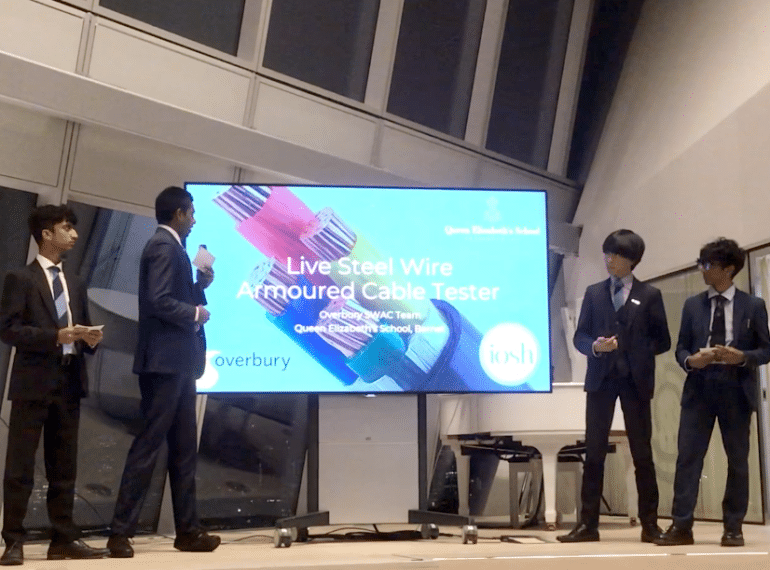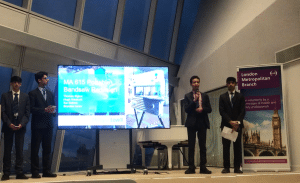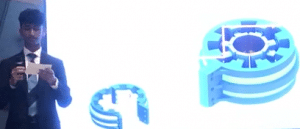Stay safe! Sixth-formers rise to the occasion in engineering H&S challenges

Two Sixth Form teams devised innovative engineering solutions to workplace safety challenges and successfully presented them to the world’s largest health & safety organisation.
 The presentations were part of this year’s QE submissions under the Engineering Excellence Scheme (EES). The Year 12 boys are hoping to follow in the illustrious footsteps of other QE EES teams of recent years whose inventions under the Engineering Project Challenges initiative have achieved regional and national success.
The presentations were part of this year’s QE submissions under the Engineering Excellence Scheme (EES). The Year 12 boys are hoping to follow in the illustrious footsteps of other QE EES teams of recent years whose inventions under the Engineering Project Challenges initiative have achieved regional and national success.
They gave their presentations to members of the Institution of Occupational Safety and Health (IOSH, a UK-based global chartered body for health & safety professionals), just before the COVID-19 social distancing measures were put in place The venue was UBM’s centre close to Blackfriars Bridge in London.
QE’s Head of Technology, Michael Noonan, said: “The teams had been set engineering challenges to work on by two major office fit-out companies, Morgan Lovell and Overbury. QE has achieved brilliant things in recent years in this initiative, and this year’s boys did not disappoint: after six months’ work, they came up with carefully thought-through solutions based on sound engineering principles. They then presented these ideas fluently and with some confidence to the assembled IOSH members and other guests.”
The Engineering Project Challenges started off with a project tour and introduction to site conditions and equipment by industry sponsors Overbury and Morgan Lovell, both part of the Morgan Sindall construction group.
 After seeing demonstrations of equipment and operatives at work, the boys were charged with finding innovative solutions to two specific problems.
After seeing demonstrations of equipment and operatives at work, the boys were charged with finding innovative solutions to two specific problems.
The Overbury team had the challenge of creating an easy-to-use, hand-held, non-intrusive tool to check if an electrical steel wired armoured cable is live. The team members are: Enoch Hitchcock, Yai Sagolsem, Pranay Surana and Ukendar Vadivel.
The Morgan Lovell team were tasked with making health & safety improvements to a portable band saw, including blade protection and extraction of dust, to ensure that users could cut material both safely and quickly. The blade protection had to be designed in such a way that it could be retrofitted to existing machines. The team comprises: Brandon Ionev, Thomas Mgbor, Kai Sethna and Hugh Westcott.
Both teams were required to undertake analysis through extensive research to find the best practical and innovative engineering methods, and to solve these challenges without involving excess manufacturing costs. They were assisted by their industry mentor, representing Overbury and Morgan Lovell, Health Safety & Wellbeing Manager Alex Wood.
In their 15-minute presentation, team leader Ukendar and his fellow team members working on the project with Overbury explained their solution – a device featuring a hinged clamp and a handle with red and green LEDs to indicate whether the cable being worked on was live or not. In a question-and-answer session with members, they confirmed that the device could readily be manufactured to accommodate different sizes of steel wired armoured cable.
The Morgan Lovell team explained that their guard could be easily and quickly fitted to a band saw in a busy workplace environment. Questioned as to why they had made it in opaque materials, they confirmed that this was just for the prototype and that production models could be made in transparent ABS plastic.
Overall, the objective of the challenges is to introduce young people to careers in the construction and building fit-out and office fit-out industries and to help them apply what they have learnt about STEM (Science, Technology, Engineering and Mathematics) in the classroom into the real world.
The two teams will be hoping to emulate the successes of predecessors, including a 2018 QE team who devised a stair-climbing robot for transporting large sheets of material up staircases on construction sites. This was Highly Commended in the Contribution to the Business Award at the Celebration and Assessment Day of the Engineering Excellence Scheme (EES). And in the year before that, a QE project for the EES – a helmet which warned construction workers when workplace noise was exceeding safe levels – was among the national engineering prize-winners at The Big Bang, the UK Young Scientists & Engineers Fair.
